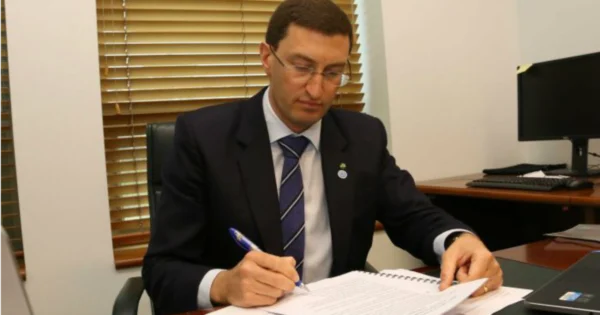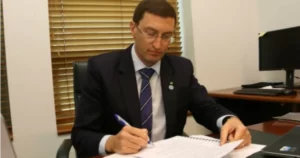FEDERATION CHAMBER
7 MARCH 2023
‘The Ministry of Peace concerns itself with war, the Ministry of Truth with lies, the Ministry of Love with torture and the Ministry of Plenty with starvation.’ So said George Orwell when describing the political practice of asserting one thing and doing the direct opposite.
For most of us, the writings of George Orwell serve as a warning; for some in the government, they act as a playbook.
On 16 December 2022 the Attorney-General issued a press release entitled ‘Albanese government to abolish Administrative Appeals Tribunal’. It was a media release so partisan that the Attorney-General’s Department has not put it on its website. Indeed, the only place it appears is on the Attorney-General’s ‘Mark Dreyfus MP’ personal website.
Think about that for a minute. Here is a major decision to gut a major legal institution, a purge without precedent in our history and a decision that will potentially have flow-on effects affecting tens of thousands of cases, but the media release is so vitriolic and so partisan that the department, to its credit, won’t allow the release on its website.
The decision to rip up a respected institution is all about politics, it’s about settling scores and it’s about stacking a new institution from the start.
In any decision-making system and in any legal system you judge performance by the quality of decisions. The AAT is a uniquely Australian institution whereby individuals can seek merits review of decisions of the government. Many do so without costly legal representation. Tens of thousands of government decisions are challenged and tested. In 2021-22 an average of 850 applications for review were lodged every week.
These are decisions about migration, citizenship, child support, social security, the NDIS, taxation, veterans and workers compensation. Every day the AAT makes decisions that directly determine the course of the lives of Australian families. In 2021-22, 20,800 migration refugee cases were finalised, as well as 12,000 social security and child support decisions and 3,300 NDIS decisions.
No-one should be under any illusions. These are difficult decisions. Yet the benchmarking of user feedback indicates strong support for the responsiveness and level of service given. The user satisfaction rate in 2021-22 was 74 per cent—above the target of 70 per cent.
Now keep in mind that there are many cases where participants were dissatisfied with the final result and yet their satisfaction of their treatment by the tribunal was high. The tribunal outperformed its target.
As well, decisions must be robust. The AAT takes great pressure off the courts. The best test of this is the rate of successful appeals. The AAT’s benchmark it sets itself is fewer than five per cent successful appeals on appealable decisions. In 2021-22 the result was 1.9 per cent, and well under target.
The AAT has also worked to lift confidence in decision-making by the publication of key decisions. In 2021-22 a target of 5,000 published decisions was set. This was exceeded, with over 5,400 decisions published in 2021-22.
On the key measure of performance, the AAT was meeting the mark. You judge a system on how it’s performing. But the Attorney-General’s complaint wasn’t about performance; it was about politics. That’s why the government said that there would be no changes to the AAT staff, only to tribunal members.
The Attorney-General’s press release announcing his purge claimed that as many as 85 people serving on the tribunal were associated with the Coalition, yet this was a dubious claim taken from Crikey and the left-wing Australia Institute, an institute that covers its partisanship by misappropriating the name of the country we share.
The people who are on the Dreyfus-Crikey-Australia Institute hit list include people who have done nothing more than be a volunteer member of the Liberal or National parties. It sounds McCarthyist because it is McCarthyist. You can imagine that for nine years the Attorney-General read Crikey like gospel late at night, slowly building his enemies list.
The Attorney says that he seeks to purge people he claims are unqualified. He wants to give them the Hu Jintao treatment. He doesn’t care whether the people he has targeted are qualified or not. What he really wants is a supine tribunal that will rubberstamp the decisions of his government.
The Attorney seeks to purge people who are qualified and who believe in public service but who do not meet the Attorney’s Labor loyalty test—a test that the Australian Public Service would rightly consider illegal.
So let’s look at the statutory qualifications for appointment to the Administrative Appeals Tribunal.
They are either being enrolled as a legal practitioner for at least five years or having special knowledge or skills relevant to their duties. Among the people that the Attorney-General wants to purge are people with master’s degrees from Ivy League and Oxbridge universities, people with doctorates in law, people with first-class honours degrees and at least two university medallists.
They include senior decorated military officers and others who have served in the Australian Defence Force, senior public servants, academics, barristers, partners in law firms and police officers with decades of experience.
They include people who’ve served on tribunals at a state and territory level, including one person who headed a territory tribunal and was appointed to that role by the Labor Party.
They include public servants who headed departments and agencies, including public servants who have received the Public Service Medal for their work as a public servant.
They include a former deputy registrar of a state Supreme Court, a former Sex Discrimination Commissioner, the chair of the Accounting Standards Board and the editor of the legal service on practice and procedure for one of the state tribunals.
This is by no means an exhaustive list of their qualifications. While the Attorney-General’s list includes people who have served in this place and in the Senate, in state and territory parliaments and as advisers, that should not in and of itself exclude a person from appointment. In fact, when the Coalition was in government we appointed several former Labor parliamentarians who were qualified to the tribunal.
The Attorney is now purging these people and replacing them with up to 150 new tribunal members. This includes the 75 new tribunal members and at least the same number again of existing tribunal members who have been invited to reapply for their jobs.
News reports indicate the cost in pay-outs for the Attorney-General’s cultural revolution are in excess of $10 million—and this doesn’t include any claim for loss of earnings as a result of the Attorney-General’s outrageous decision to publicly sully the reputations of those who serve on the tribunal.
The Attorney-General says he will institute an independent selection committee. The committee is to be made up of three members: first, the new AAT president, who will be appointed by the Attorney; second, the Attorney-General’s Department secretary; and third, a delegate representing the Attorney-General. Independent? Three people—someone who reports to the Attorney-General, someone representing the Attorney-General and, finally, somebody appointed by the Attorney-General who might be subjected to the Attorney-General’s ‘please explain’ phone calls.
That’s important, because it leads us to the appalling treatment of former AAT president Justice Fiona Meagher. We know from news reports that the Attorney called her on 12 November, after Justice Meagher put out a statement detailing the progress the tribunal had been making since her appointment. Justice Meagher had commenced as president just eight months earlier. The call from the Attorney, according to the Financial Review, was a ‘please explain’ call.
We know that within weeks Justice Meagher had resigned and silently moved to the Federal Court. We don’t know the full circumstances of that call, but we know that that statement from Justice Meagher has been scrubbed from the AAT website.
Justice Meagher has been erased from history in a true Orwellian tradition. Justice Fiona Meagher, a respected leader and a respected lawyer, is now serving on the Federal Court, and I wish her well. The day will come when we will hear the full story of this disturbing episode.
I believe more was at play than purging people with any association with the Coalition and replacing them with supine Labor supporters and left-wing legal activists who will do the bidding of this government.
One aspect of the AAT’s work I’m concerned about is its important work in helping keep our borders secure. I’m concerned this is about the further weakening of our border protection system. In the immigration and refugee division of the tribunal, about 20,900 decisions were made in 2021-22. At the end of 2021-22, there were 56,100 decisions on hand.
Our borders are strong, and I don’t want the AAT, because of its members, to become the weakest link in our border protection chain.
It was because of Peter Dutton that hundreds of violent and sexual offenders had their visas cancelled. We don’t want to see a cohort of Labor lawyers and left-wing activists making decisions that undermine our border protection regime, allow criminals to stay and weaken our visa system.
Labor’s actions are all about purge and stack. They have nothing to do with improving the decision-making system Australians rely on. Labor’s dismantling of a trusted decision-making system will play itself out in second- and third-order consequences such as on our borders.
When that happens, the Attorney-General won’t be able to hide and blame it on the AAT, saying it was the AAT’s fault. When that day comes, as it surely will, we will hold the Attorney-General to account.



